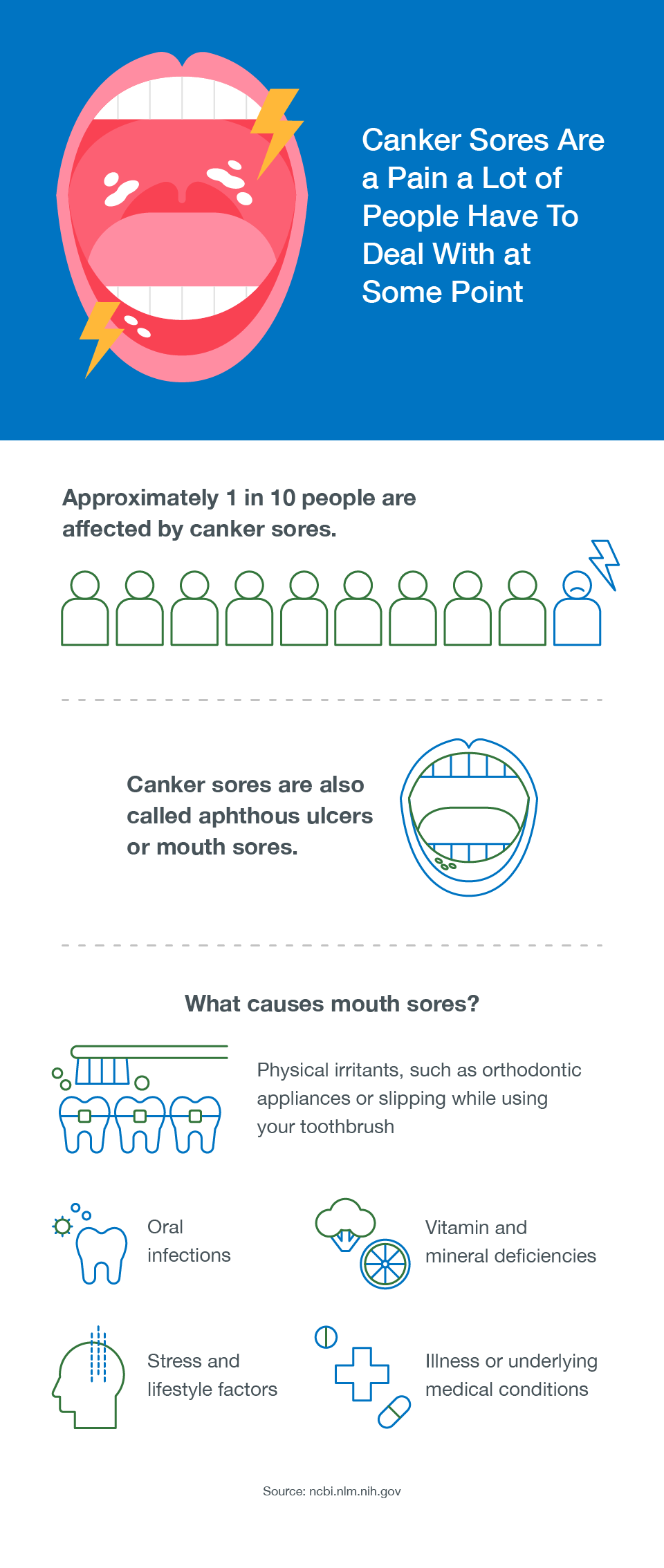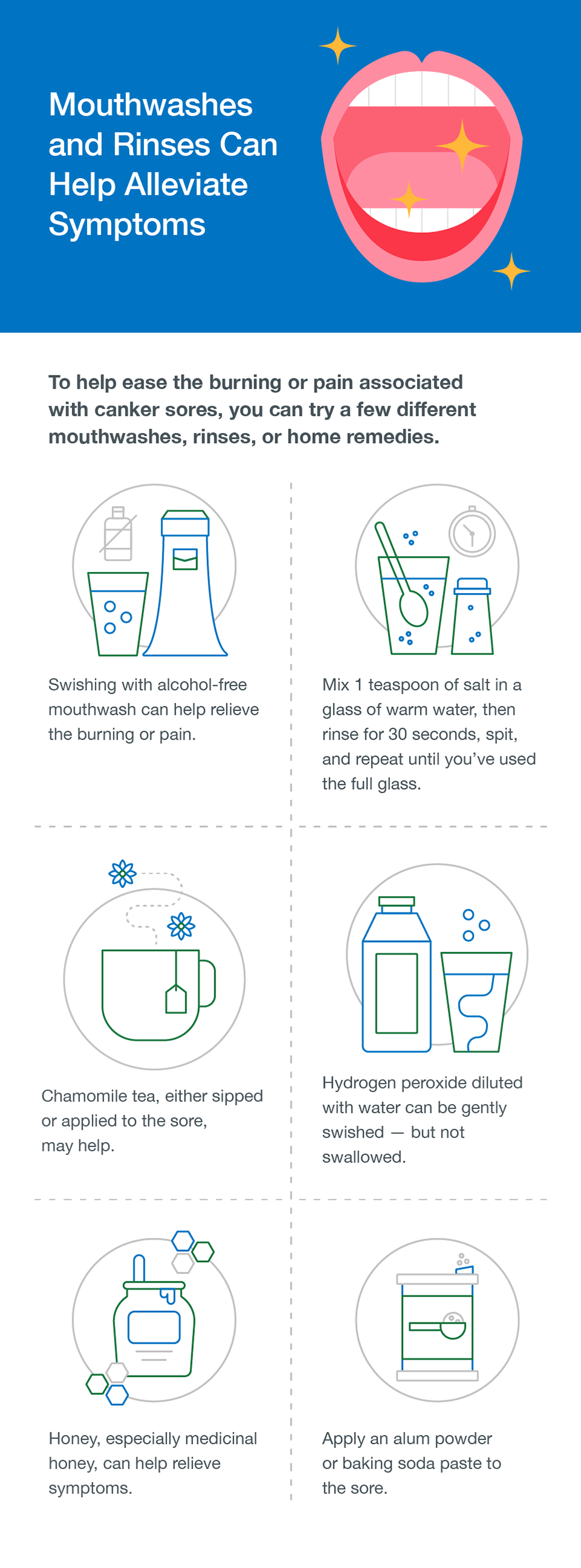Does Mouthwash Help Canker Sores?
Approximately one in 10 people are affected by canker sores. While most oral healthcare providers recommend allowing them to heal on their own, many people turn to holistic, DIY, or natural products to help manage the pain of aphthous ulcers. Some people turn to mouthwash to help keep canker sore pain at bay.
Looking for the best mouthwash for mouth sores? Managing canker sores or aphthous ulcers starts by understanding the potential cause behind them, how long it normally takes for mouth sores to heal, and what is or isn’t safe to use to help treat them.
What Causes Canker Sores and Mouth Sores?
Canker sores are also called aphthous ulcers or mouth sores. Eighty-five percent of people who get canker sores experience minor ones that are relatively small — less than the size of a pea. On occasion, major canker sores can be much larger.
They are not the same thing as fever blisters or cold sores, which are associated with an underlying strain of the herpes virus just like chickenpox and shingles. According to the American Dental Association, or ADA, aphthous ulcers can be caused by:
- Physical irritants, such as orthodontic appliances or slipping while using your toothbrush
- Oral infections or illness of some sort
- Underlying medical conditions
- Vitamin and mineral deficiencies
- Stress and lifestyle factors
If you know someone who recently started wearing braces, you may see ulcers develop inside of their lips or cheeks where wires or brackets rub their mouth. This is why orthodontists frequently provide orthodontic wax, which creates a barrier between the braces and skin. Normally, most orthodontic patients develop thicker, keratinized skin in these locations, reducing recurring mouth sore flareups.
Similarly, broken teeth or dental work can also cause physical irritation to the mouth, creating aphthous ulcers adjacent to those teeth. If the ulcer is on the gums near the root of the tooth and there is visible drainage, it may be an abscessed tooth, not an aphthous ulcer, and you should probably visit your dental professional.
Someone who experiences intense amounts of stress may consequently have a weaker immune system, predisposing them to the development of mouth sores. We also know that people who have recurring canker sores may be deficient in vitamins such as B12, zinc, and folic acid, or have underlying gastrointestinal disorders like celiac disease, Crohn’s, or inflammatory bowel disease (IBD).
In most cases, a mouth sore will develop a white, filmy-looking cover across its surface within one to three days of the initial flareup. Unfortunately, major canker sores can take up to four weeks to heal in some cases. This can be troublesome, and sores that do not heal within two weeks should be evaluated by your dentist due to the risk of possible oral cancer or other pathology.
How Does Mouthwash Help?
You can make a basic canker sore rinse which may help get rid of mouth sores or ease symptoms by adding salt to warm water. Although salt applied directly to mouth sores causes pain, rinsing with the diluted mixture provides the opposite reaction due to its anti-inflammatory effects on mucous membranes. Mix one teaspoon of salt in a glass of warm water until fully dissolved. Then rinse with it for 30 seconds, spit, and repeat until you’ve used the full glass.
Hydrogen peroxide can also be diluted with water to dab onto the mouth sore or gently swished like a mouthwash.
If you’re not able to ask your dentist to call in a prescription for “miracle mouthwash,” which contains an antihistamine, antacid, and lidocaine, you can dissolve an antacid in your mouth next to the ulcer. Just make sure not to exceed dosage recommendations. Your dentist might also recommend combining liquid Benadryl with milk of magnesia to either rinse with (but not swallow) or dab onto the ulcer.
Finally, alcohol-free mouth rinses with natural ingredients can also ease symptoms of irritation, burning, and swelling.
Does Alcohol Irritate Mouth Sores?
If you have a canker sore, mouthwash selection is important. Many popular mouthwash brands contain alcohol because it helps with shelf life and the suspension of other ingredients in the liquid. It’s also a natural antimicrobial. But for a canker sore, mouthwash with alcohol in it may be counterintuitive, particularly because of the burning sensation and irritation that comes from it.
The best mouthwash for mouth sores is one that’s gentle and alcohol-free. Using a mouthwash that contains alcohol will likely cause pain if there are active aphthous ulcers. Studies show that using alcohol-free mouthwash to rinse with or to apply directly to the ulcers as a topical treatment is beneficial.
Also, be sure to avoid any mouth rinses that contain sodium lauryl sulfate (SLS). It’s frequently found in home care products, particularly toothpaste, and is known for causing oral reactions such as sloughing skin or mouth sores.
Are Natural Methods Effective?
Looking for an all-natural canker sore remedy? You might not have to look any further than your kitchen pantry.
Honey
Some research shows that applying honey to your canker sore can help lessen the severity of pain and the amount of time the mouth sore lasts, especially compared to ulcers where honey isn’t applied. Honey can be used for other types of wound management, including in medical settings with conditions much more severe than aphthous ulcers. Just keep in mind that honey has sugar in it, so you don’t want to keep it in your mouth for long periods on a regular basis.
Chamomile
You can also potentially help get rid of mouth sores or discomfort by creating a chamomile tincture. Studies show that the chamomile product can help ease burning and pain when applied to oral ulcers. If you have chamomile tea, you can sip it or hold it in your mouth for several seconds to get longer exposure times.
Alum Powder or Baking Soda
Do you ever pickle vegetables from your garden? A pinch of alum powder can be applied directly to your ulcer to help shrink its size. Just be prepared for the bitter taste that comes with it. Some people mix alum powder with water to create a paste that they then apply to their ulcer. You can do the same thing with baking soda if you like.
Conclusion
Although there are several things you can do to try to get rid of mouth sores or alleviate the discomfort of ulcers, they will almost always resolve on their own within one to two weeks. That being said, the significant discomfort they cause can be frustrating and uncomfortable. This is why DIY, holistic, and non-alcoholic mouthwashes and rinses and other products may help soothe irritation or shorten the normal healing time.
If factors such as IBD or Crohn’s disease are at play, be sure to work with your medical provider to manage the condition and associated symptoms. Supplementing with vitamins B12 and folic acid may also be helpful in preventing frequent canker sore flareups. Keep in mind, too, that stress management — when possible — can be beneficial. Meditation, mindfulness exercises, physical movement, and even medication for stress and anxiety may be helpful.
If, for any reason, your aphthous ulcers do not heal within two weeks, make an appointment to see your dentist. It could be something more serious that requires immediate medical attention and assistance.






